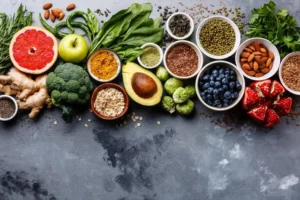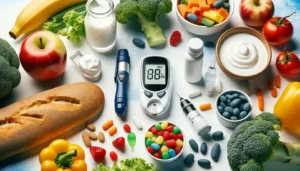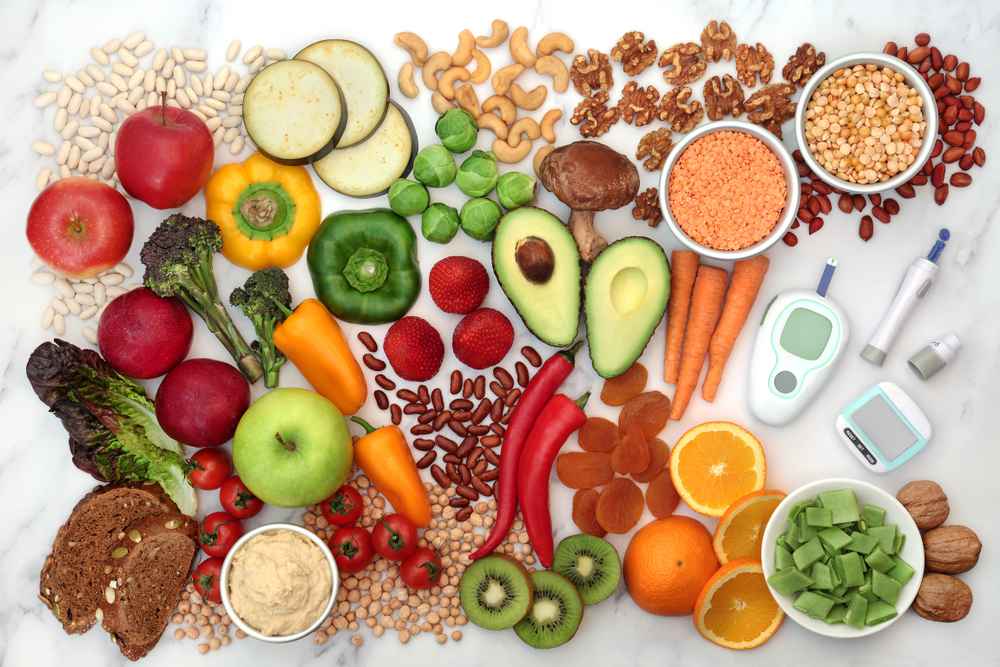Diabetes requires a thoughtful approach to nutrition, making conscious choices that not only manage blood sugar levels but also promote overall well-being. Hence, in this comprehensive guide, we explore a variety of diabetes remedies and foods that can become powerful allies in your journey toward better health. From nutrient-dense superfoods to practical lifestyle adjustments, discover a wealth of options to enhance your diabetes management and embrace a flavorful, balanced life.
Contents
What Is The Importance Of Diabetes Remedies And Foods?
 The importance of diabetes remedies and foods cannot be overstated, as they play a crucial role in managing and controlling this chronic condition. Here are some key reasons highlighting the importance of diabetes remedies and foods:
The importance of diabetes remedies and foods cannot be overstated, as they play a crucial role in managing and controlling this chronic condition. Here are some key reasons highlighting the importance of diabetes remedies and foods:
- Blood Sugar Regulation: Proper nutrition and the right food choices are fundamental in controlling blood sugar levels. Balanced meals, rich in complex carbohydrates, lean proteins, and healthy fats, help prevent spikes and crashes in blood glucose.
- Prevention of Complications: Uncontrolled diabetes can lead to severe complications such as heart disease, kidney damage, nerve problems, and vision impairment. By adopting a diabetes-friendly diet and remedies, individuals can reduce the risk of these complications and enhance their overall well-being.
- Optimal Nutrient Intake: Diabetes can sometimes lead to nutrient deficiencies. By focusing on a well-rounded diet that includes a variety of nutrient-dense foods, individuals can ensure they are getting the vitamins and minerals necessary for overall health.
- Energy and Stamina: Diabetes can affect energy levels, and fluctuations in blood sugar can lead to fatigue. A balanced diet provides a steady source of energy, helping individuals maintain stamina throughout the day.
- Improved Insulin Sensitivity: Certain foods and dietary patterns can positively impact insulin sensitivity. This is crucial for individuals with diabetes, as it allows the body to use insulin more effectively, leading to better blood sugar control.
- Long-Term Disease Management: Diabetes is a chronic condition that requires consistent, long-term management. Adopting a lifestyle that includes diabetes-friendly foods and remedies provides individuals with the tools to effectively manage their condition and lead a fulfilling life.
Overall, the importance of diabetes remedies and foods lies in their ability to regulate blood sugar and contribute to overall health and well-being. A holistic approach that combines a diabetes-friendly diet with other healthy lifestyle choices is key to successfully managing this condition.
What Foods Reduce Blood Sugar Quickly?
 While managing blood sugar levels is crucial for individuals with diabetes, it’s important to note that no single food can dramatically reduce blood sugar instantly. However, incorporating certain foods into your diet may help contribute to more stable blood sugar levels over time. Here are some foods that may have a positive impact on blood sugar regulation:
While managing blood sugar levels is crucial for individuals with diabetes, it’s important to note that no single food can dramatically reduce blood sugar instantly. However, incorporating certain foods into your diet may help contribute to more stable blood sugar levels over time. Here are some foods that may have a positive impact on blood sugar regulation:
Non-Starchy Vegetables
Non-starchy vegetables are an excellent foundation for a diabetes-friendly diet. Vegetables such as leafy greens (spinach, kale), broccoli, cauliflower, peppers, and zucchini are low in carbohydrates and high in fiber. Fiber helps slow down the absorption of sugars in the bloodstream, promoting more stable blood sugar levels. Additionally, these vegetables are rich in essential vitamins, minerals, and antioxidants, contributing to overall health.
Berries
Berries are a delicious and nutritious addition to a diabetes-friendly diet. Strawberries, blueberries, and raspberries are packed with fiber and antioxidants, which not only support digestive health but also help regulate blood sugar levels. The fiber content slows down the digestion process, preventing rapid spikes in blood sugar. Berries are also relatively low in carbohydrates compared to some other fruits, making them a smart choice for individuals managing diabetes.
Nuts and Seeds
Nuts and seeds are nutrient-dense snacks that can aid in blood sugar management. Almonds, walnuts, chia seeds, and flaxseeds provide a combination of healthy fats, protein, and fiber. The trio of these nutrients helps promote a feeling of fullness and slows down the absorption of carbohydrates, leading to more controlled blood sugar levels. However, portion control is essential due to their calorie density.
Legumes
Legumes, including beans, lentils, and chickpeas, are excellent sources of plant-based protein and fiber. The combination of protein and fiber contributes to a slower rise in blood sugar levels after meals. Incorporating legumes into your diet may also enhance satiety, helping with weight management, which is crucial for individuals with diabetes.
Whole Grains
Opting for whole grains over refined grains is a wise choice for blood sugar control. Whole grains such as quinoa, barley, brown rice, and oats contain fiber, vitamins, and minerals. The fiber content helps regulate the absorption of glucose, preventing sudden spikes. Including these grains in balanced meals provides sustained energy and promotes overall cardiovascular health.
Fatty Fish
Fatty fish like salmon, mackerel, and sardines are rich in omega-3 fatty acids. These healthy fats have been linked to improved insulin sensitivity, potentially benefiting individuals with diabetes. Including fatty fish in your diet can be part of a heart-healthy approach, supporting overall cardiovascular well-being.
Cinnamon
Cinnamon is a flavorful spice that may offer benefits for blood sugar regulation. Some studies suggest that cinnamon can improve insulin sensitivity and lower blood sugar levels. Sprinkling cinnamon on foods or incorporating it into recipes can add a delightful flavor while potentially contributing to better glucose control.
Apple Cider Vinegar
Apple cider vinegar has gained attention for its potential role in improving insulin sensitivity and reducing post-meal blood sugar levels. Consuming a small amount of apple cider vinegar diluted in water before meals may be considered. However, it’s essential to exercise caution, especially for those with digestive issues, and consult with a healthcare professional before making it a regular practice.
Greek Yogurt
Greek yogurt is a protein-rich dairy option that can be beneficial for blood sugar management. Protein helps stabilize blood sugar levels, and choosing plain, unsweetened Greek yogurt avoids added sugars. It can be a versatile ingredient in meals or enjoyed as a snack, contributing to a balanced diet for individuals with diabetes.
Green Tea
Green tea contains compounds, such as catechins, that may have positive effects on insulin sensitivity and blood sugar regulation. Including green tea in your beverage choices can be a health-conscious decision, providing hydration along with potential metabolic benefits. However, it’s crucial to maintain moderation and consider individual responses to caffeine. As always, consulting with healthcare professionals is advisable for personalized recommendations.
It’s crucial to note that individual responses to foods can vary, and it’s always advisable to consult with a healthcare professional or a registered dietitian for personalized advice. Additionally, portion control, regular physical activity, and overall lifestyle choices are integral parts of managing blood sugar levels effectively.
What Are Some Other Diabetes Remedies To Help?
 In addition to incorporating diabetes-friendly foods into your diet, several other diabetes remedies and lifestyle modifications can contribute to better diabetes management. So, here’s an overview of some additional diabetes remedies:
In addition to incorporating diabetes-friendly foods into your diet, several other diabetes remedies and lifestyle modifications can contribute to better diabetes management. So, here’s an overview of some additional diabetes remedies:
Regular Exercise
Engaging in regular physical activity has numerous benefits for individuals with diabetes. Exercise helps improve insulin sensitivity, lowers blood sugar levels, and supports weight management. It’s important to find activities you enjoy, whether it’s walking, cycling, swimming, or strength training, and aim for at least 150 minutes of moderate-intensity exercise per week.
Stress Management
Chronic stress can contribute to elevated blood sugar levels. Incorporating stress-reducing activities such as mindfulness meditation, deep breathing exercises, yoga, or hobbies can be beneficial. Finding effective ways to manage stress is an essential component of holistic diabetes care.
Adequate Sleep
Poor sleep quality or insufficient sleep can affect blood sugar control and insulin sensitivity. Establishing a consistent sleep routine, creating a comfortable sleep environment, and addressing any sleep disorders can contribute to better overall health and diabetes management.
Hydration
Staying well-hydrated is important for everyone, including those with diabetes. Water helps regulate blood sugar levels, supports kidney function, and aids in digestion. Avoid sugary beverages and opt for water, herbal teas, or other low-calorie, sugar-free options.
Portion Control
Monitoring portion sizes is crucial for managing blood sugar levels and weight. Eating consistent, balanced meals and avoiding overeating can prevent sudden spikes in blood sugar. Paying attention to portion sizes, especially for carbohydrate-rich foods, is an important aspect of diabetes management.
Regular Blood Sugar Monitoring
Regular monitoring of blood sugar levels helps individuals understand how their body responds to different foods, activities, and medications. This information is valuable for making informed decisions about diet, exercise, and medication adjustments in consultation with healthcare professionals.
Medication Management
Adhering to medication schedules as prescribed by healthcare providers is essential for effective diabetes management. Whether using oral medications or insulin, taking medications as directed, and communicating any concerns or changes in response with healthcare professionals is crucial.
Regular Check-ups
Regular medical check-ups, including eye exams, foot exams, and screenings for cardiovascular health, are important for early detection and prevention of diabetes-related complications. These routine check-ups enable healthcare professionals to monitor overall health and make necessary adjustments to the diabetes management plan.
Quit Smoking
 Smoking is associated with an increased risk of complications for individuals with diabetes, including heart disease and circulation problems. Quitting smoking is a critical step in improving overall health and reducing the risk of diabetes-related complications.
Smoking is associated with an increased risk of complications for individuals with diabetes, including heart disease and circulation problems. Quitting smoking is a critical step in improving overall health and reducing the risk of diabetes-related complications.
It’s essential to approach diabetes management holistically, addressing both lifestyle factors and medical interventions. Individual responses to remedies may vary, and personalized guidance from healthcare professionals is crucial to developing an effective and tailored diabetes management plan. Always consult with your healthcare team before making significant changes to your diet, exercise routine, or medication regimen.
Conclusion
In conclusion, diabetes remedies and foods involve a holistic approach that goes beyond just monitoring blood sugar levels. By incorporating diabetes-friendly foods like non-starchy vegetables, berries, and nuts, individuals can support stable blood sugar. Regular exercise, stress management, and sufficient sleep play crucial roles in overall well-being. Additionally, maintaining hydration, portion control, and medication adherence are vital aspects of effective diabetes management.
Remember, each person’s journey is unique, and it’s important to consult with healthcare professionals for personalized advice. With a combination of healthy lifestyle choices, support, and ongoing education, individuals with diabetes can lead fulfilling lives while taking charge of their health.
Do you want to get rid of diabetes? Join our online diabetes treatment program and reverse Diabetes naturally through lifestyle changes such as a Personalized Diet plan, Exercise, Yoga, dieticians, and health coaches.

